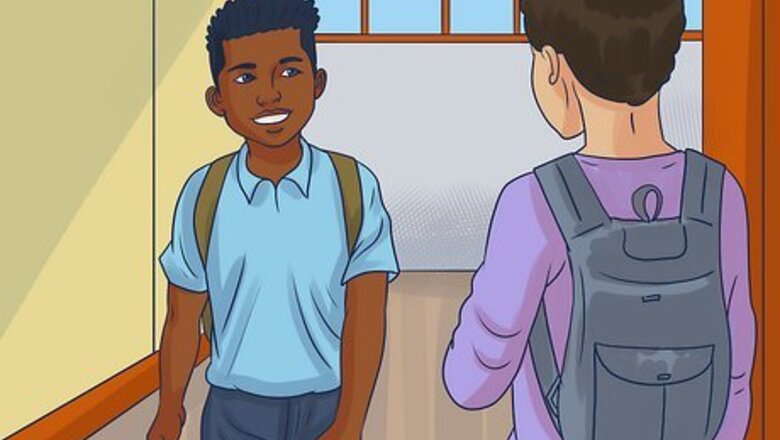
views
Deterring Bullies
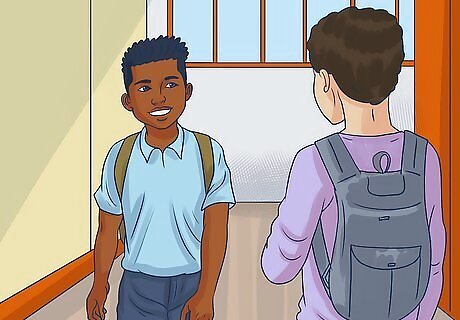
Be confident. Bullies typically seek easy targets. They try to pick on someone who they think lacks the confidence to stand up to them. If you portray confidence, you will avoid a lot of bullying. Take a martial arts class. By learning martial arts, you have a much better chance of winning a fight against your bully in case they attack you first. This is because martial arts teaches you to be a trained fighter and not afraid of standing up for yourself. It will help make you very confident in yourself. Give off confident body language by standing up straight when navigating the hallways. While this may seem like a minor change, it can really convey confidence. Make eye contact with people and smile slightly as you walk down the halls. Find ways to increase your own self-esteem. By investing into hobbies or extra-curricular activities, it can boost your self-worth and make you feel good about yourself.
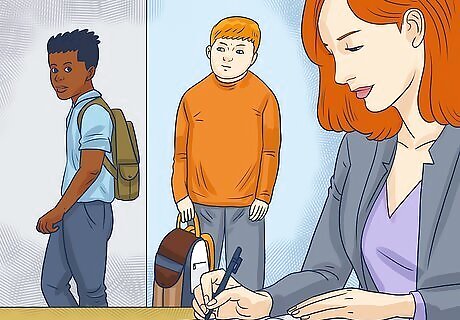
Stay within eyesight of an adult. If you linger within the eyesight of an adult, bullies will typically stay away. Bullies do not want to cause trouble for themselves, so they avoid tormenting others if a teacher or other adult is near. When navigating your school, stay in areas where teachers and other adults are typically present. For example, eat lunch close to the table where teachers sit.

Hang out in groups. Bullies may be less likely to target a big group of friends. They tend to pick on people they perceive as defenseless or powerless. If you're always surrounded by people, a bully may be intimidated and avoid bothering you. Try to get involved with a group of people who share your interests, such as by joining a club or sports team. Then, spend time with these people throughout the day. This will help to ensure that you are always with a large group of people and you will not be an easy target for a bully.
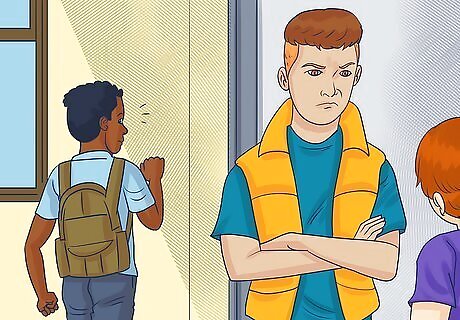
Avoid bullies altogether. If you know which kids tend to bully others, stay away from them. Avoid areas in the school where bullies congregate. If you don't have assigned seating, avoid sitting next to bullies in class. If you keep your distance from bullies, they'll have a harder time bothering you. Sometimes, bullies show up in areas you can't avoid. If your locker is located next to a bully's locker, for example, some interaction is necessary. Try to minimize this as much as you can by quickly removing your books between classes. You may also consider asking to move to a different locker to reduce or avoid conflicts with the bully.
Dealing with Bullying
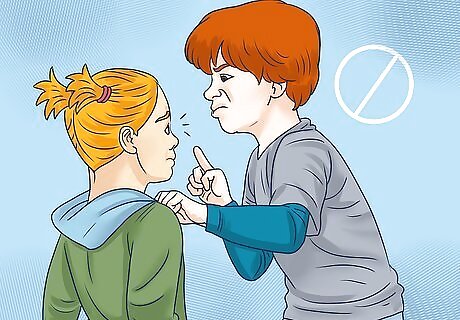
Do not bully back. If you want to avoid being bullied, you have to avoid doing it to others. This helps create a culture of respect between you and your classmates. Avoid kicking, fighting, or yelling at a bully. Escalating the situation can be dangerous and will only give the bully the reaction they want. Try taking a few deep breaths before you react or do anything. This will help you to stay calm and maintain your composure.
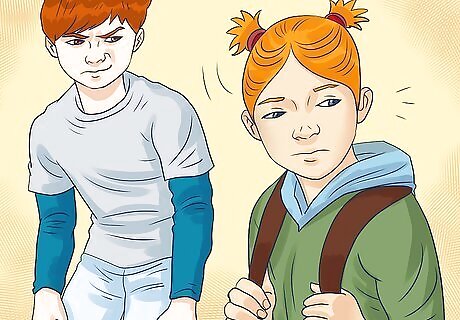
Try to ignore it. If you're able to tune it out, do so. Bullies enjoy knowing their tactics have impacted someone's mentality, so temporarily concealing your reaction may help. If a bully says or does something to you, pretend you didn't notice and proceed with your day. Bullies may get bored with targets that don't react to their antics.
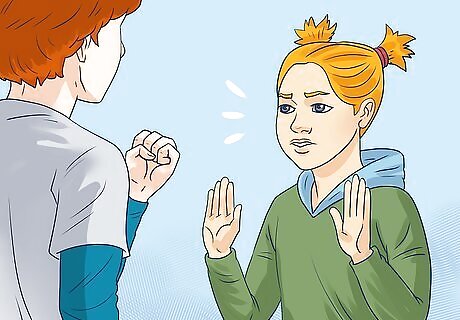
Stand up for yourself. If a bully doesn't back down even if you ignore them, calmly address the issue. Instead of getting angry and yelling or fighting back, slowly and confidently tell the bully off. Plan what you will say ahead of time if you have a recurring bully situation, and practice saying it at home in a mirror several times so that you will be prepared. Use a loud, clear voice to let the bully know you don't like their behavior. Say something like, "Stop doing that now." Then, walk away from the situation. Bullies don't usually expect this type of assertive behaviour from victims, therefore doing so will make them quickly back off. Do the same if you see a bully harassing another student. If bullies see kids in your school won't tolerate their antics, they're more likely to stop.
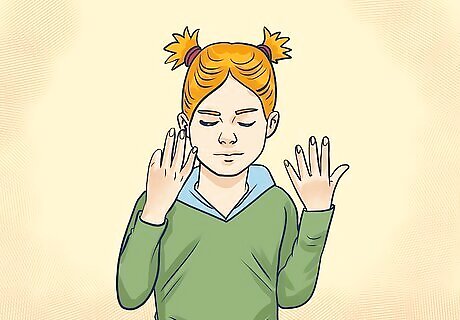
Distract yourself from bullying. If you're very distressed by a bully, find other things to occupy your mind. In situations where you're getting bullied, do a small mental exercise. Recite the alphabet backwards. Count back from one hundred. Try to make a mental list of names that start with the letter "A."

Find someone to talk to. While it's great to ignore the bully in the moment, do not keep your feelings bottled up. After you've been harassed by a bully, talk things out with a trusted friend or adult. Rant about your feelings so you get them out of your system and feel better. Writing your feelings in a journal or doing something artistic like painting or drawing may also be helpful as an emotional outlet.
Preventing Cyber Bullying

Use disengagement to discourage cyberbullying. If you are being bullied online, then one of the best ways to deal with it is to disengage. You can ignore the person, block them, or log off to avoid encountering the bully online. You can also delete bullying messages and posts, but make sure that you show an adult the bullying posts and/or screenshot them before you delete them. If the situation is severe, you may want to delete your social media accounts and stay offline.
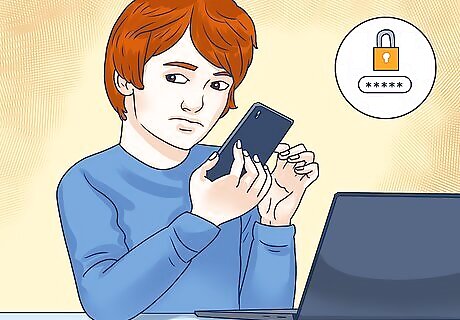
Keep your password a complete secret. If someone can get onto your account, they can create a lot of problems for you. Keep your password a secret from everyone. Even trusted friends can accidentally reveal your password to others. The only person who should know your password to your email and social media accounts is you. If you're worried about forgetting your password, most sites have ways you can retrieve or reset it. While forgetting your password can be a hassle, it's rarely a major issue. If for some reason someone does get the password to your account, change it immediately.
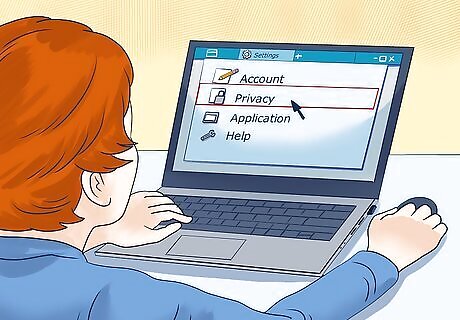
Adjust your privacy settings. If you are experiencing or concerned about someone bullying you online, alter your settings. Changing your privacy settings on your profiles will allow you to post things that only your friends can see. Make things like Twitter and Facebook private to public audiences. Only add close, trusted friends on these sites.

Think carefully about the content you post. If you are being bullied for your posts, use more discretion when posting. Stay away from topics that could encourage bullies. Sensitive information can be shared via emails or private messages instead. You should also avoid posting anything aggressive about other classmates, even something veiled. This can anger and encourage bullies. Rant to a friend if you're mad about something instead of posting it online. Try to sleep on it before you post or at least wait an hour before posting anything. This will give you time to think about the possible implications of your post and help to ensure that you are not posting in an emotional state.
Seeking Outside Help
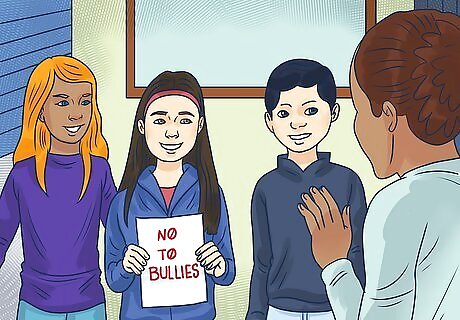
Join or start a club to help curb bullying at your school. Bullying has come to light as a major problem in recent years. Many groups are dedicated to addressing bullying in schools. If your school has an anti-bullying group, sign up. You can also start a group in your school to address bullying. In addition to helping combat the issue of bullying, a group will provide you with emotional support.
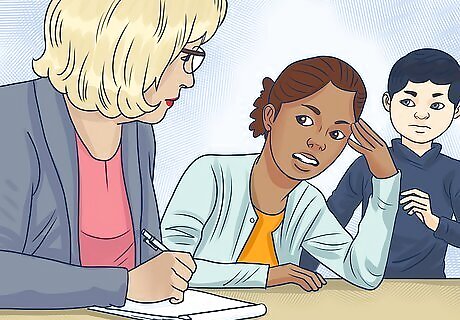
Tell an adult. If you can't stop a bully on your own, talk to an adult. Do not think of this as snitching. Bullies can cause major issues for you and other students. You should not let your bully continue to harass you. In school, report the bully to a teacher or counselor, but do it privately. Even if your bully isn't around, they may have friends in your class who will tell your bully that you reported them. If you prefer, you should send your teacher or counselor an email through your school account to report the bully. Tell your parents about what is happening in school. Your parents should call your counselor and tell them about your bully. If your school will not listen to you, they will listen to your parents because your school is responsible for you. If you are being bullied outside of school, a police officer can also help you. If you are being bullied and a police officer is around, ask for their help. If you are concerned that the bully might retaliate, then you can let the adult know that you want to find a solution to the problem and that you are not trying to get the bully into trouble. This may help the adult to determine how to proceed and reduce the chances that the bully will retaliate.
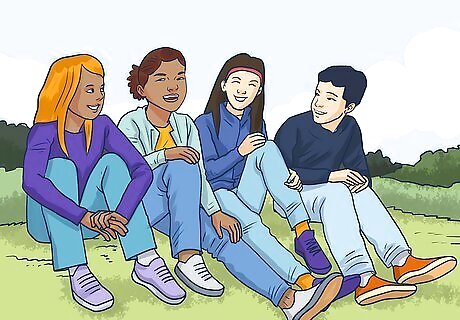
Strengthen your current friendships. Instead of focusing on people who are mean to you, focus on students worth your time. Spend quality time with close friends to strengthen your bonds. If you have strong, secure friendships, it will be easier to tune out bullies.




















Comments
0 comment